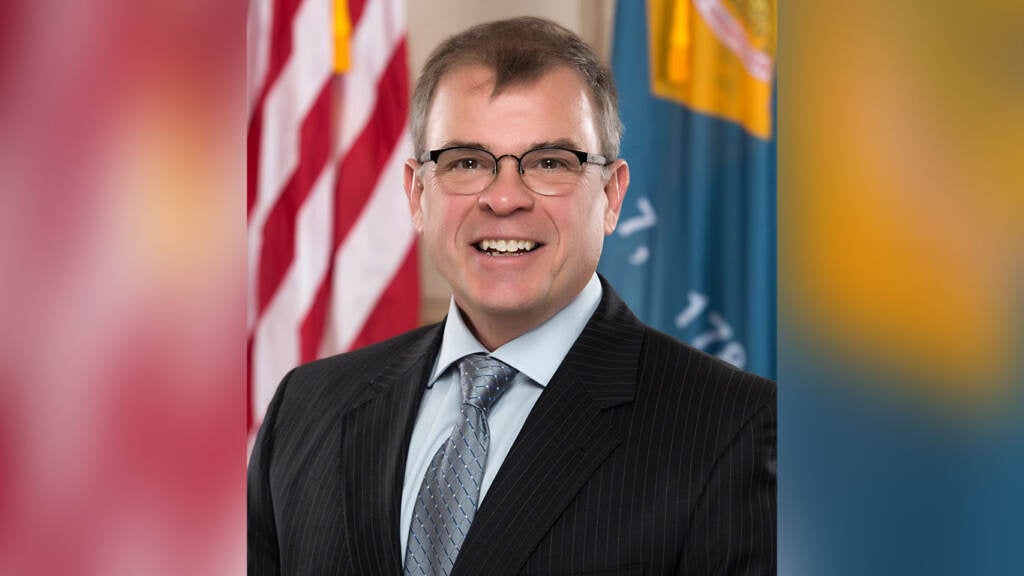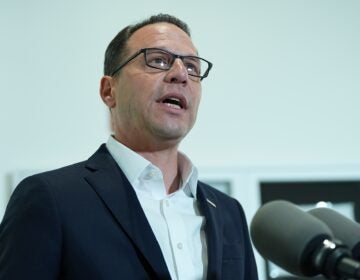Legal weed looked like a lost cause in Delaware after March vote, but new creative approach just might fly
The measure’s sponsor has split the bill into two parts. The simple majority needed to legalize possession of less than an ounce seems to be on board.

File photo: Workers at First State Compassion's new kitchen near Wilmington prepare candies and baked goods made with marijuana. (Mark Eichmann/WHYY)
The six-year legislative effort to legalize and regulate marijuana in Delaware fell two votes short of passage last month in the House, leaving advocates fearing their quest was again quashed.
But hold on.
In the past few weeks, the failed bill’s sponsor, Rep. Ed Osienski, has devised a creative way that would make it legal to have up to an ounce of weed and use it recreationally, with no repercussions.
Osienski’s gambit has led one key opponent, Speaker of the House Pete Schwartzkopf, to acknowledge in an interview this week that it could very well be successful.
Osienski, a Newark-area Democrat, split up the bill into two parts: one to remove the current civil fine for possession, and another to create, regulate and tax an industry to grow and sell marijuana in Delaware.
Here’s Part A of Osienski’s plan. It’s the easy part.
- Strip the $100 penalty and likelihood of confiscation for simple possession. Having less than 28 grams of weed was decriminalized in 2015.
- That bill would only require a simple majority, or 21 votes in the House. Osienski has 21 House sponsors on the bill, meaning it should pass easily.
“So unless something unexpected happens, I have the 21 votes to pass legalization” in the House, Osienski said.

The Senate — where the bill needs 11 votes — has a 14-7 Democratic majority. Four senators are already co-sponsors, and Osienski is confident of success in the Senate.
While passage of Part A would make it legal to have less than an ounce, users would not be able to purchase weed at a retail store in Delaware.
That brings us to Part B. Osienski says it’s harder but still doable.
- Tax all sales at 15% and create a system to authorize vendors to grow the plants and sell them in retail stores.
- This measure, because it involves a tax, requires a three-fifths majority, which means 25 votes in the House and 13 in the Senate.
Osienski believes that once marijuana is legal with the passage of Part A, he would have leverage on the lawmakers who were opposed or did not vote last month. He believes some will want to have the state receive a financial benefit and see jobs created for growers and retail sellers.
Medical marijuana has been available in Delaware for a decade, and has a well-established growing and distribution system. Thirty-six other states have medical marijuana laws.
‘I know it’s coming,’ Speaker Schwartzkopf says of legal weed
Osienski believes that once Part A is passed, there will be enough leverage on the reluctant to get the regulatory framework approved.
That way buyers won’t have to travel out of state to buy marijuana at a store. They could do that within months in New Jersey, a short ride from northern New Castle County over the Delaware Memorial Bridge.
Schwarzkopf said he tended to agree, and that while he would remain a “no” vote on legalization, he was inclined to support the taxation on sales at retail centers.
“If you’re going to tell me that marijuana is legal and come back at a later date at some other point in time to me and say, ‘Well, it’s legal, Will you tax it?’ My vote’s probably going to be yes,” said Schwarzkopf, a Democrat from Rehoboth Beach and a former state police captain.
“I’m not voting for marijuana. I’m just voting to tax marijuana that everybody else made it legal to do.”
Schwarzkopf said that while he always made it clear with Osienski and the previous sponsor, former Rep. Helene Keeley, that he was opposed to legalization, he did not lobby against it and would not do so now.
“I’ve said it all along” about legal weed, Schwartzkopf said. “It’s coming and I know it’s coming. I’m just not going to help it. But I’m not going to hurt it. I’m not going to stop it.”
The speaker also said he told the sponsors to find an innovative solution to get the legislation passed.
So that’s what Osienski did after the March vote. Told of Schwartzkopf’s remark that he would likely support the regulatory bill if legalization was approved separately, Osienski called it a positive development.
“That would be a huge help because sometimes with the speaker’s support, he may pull some additional votes along,’’ Osienski said. “I don’t know that for sure, but it could be helpful having his support. And I’m hoping some of my colleagues on the other side of the aisle would eventually vote for this because it’s not a bipartisan issue.”
Osienski pointed to a 2016 University of Delaware poll which found that 61% of residents who responded support legalization, and said he believes that number has grown higher as other states have legalized recreational weed. Currently, 18 states and the District of Columbia have done so. Maryland is putting legalization up for voter referendum in the fall.
“Delawareans, both Democrat and Republican, support this,” Osienski said. “So I’m hoping they’ll see a benefit in doing this with two bills.”
Osienski had been guardedly optimistic of passage of a single, all-encompassing bill in January when the legislative session that ends June 30 began. He pledged to put it up for a vote after a four-year period when the legislation never reached the House floor.
That occurred March 10. The measure received 23 votes in the House – two short of passage. Of the 26 Democrats, Schwarzkopf voted no, and Stephanie Bolden of Wilmington and William Bush of Dover did not vote. Of the 15 Republicans, 13 voted no and two did not vote.
That disappointed advocates like Zoë Patchell, who runs the Delaware Cannabis Advocacy Network. Patchell said surveys have shown that 150,000 Delaware adults — about 1 in 4 — report being a marijuana user.
The renewed effort that splits legalization from the regulatory framework has given Patchell renewed hope that this is the year people will be able to light up without fear of a police encounter.
“This is a significant criminal justice reform that will protect thousands of otherwise law-abiding citizens from embarrassing searches, detentions, arrests, confiscation of property, costly fines and a lot of the collateral consequences that come along with cannabis prohibition,” she said. “This is an issue that needs to be prioritized.”

Patchell hopes that this time, lawmakers stop squabbling about the regulatory structure, the issuing of licenses and other issues that have waylaid previous attempts.
“We’re hoping that lawmakers listen to the will of the people and see the writing on the wall,’’ she said. “Considering that most Delawareans will only be a short drive away from legally purchasing cannabis, I think that this piece of legislation will be a true litmus test for our lawmakers, especially in a year where the people really need to see that our government still works.”
She also said it’s “imperative” to get the regulatory bill passed.
“Cannabis consumers in Delaware need safe legal access to quality cannabis that adheres to consumer safety standards to ensure that the products and the cannabis that’s actually bought and sold here in Delaware are free from contaminants or other harmful additives,’’ she said.
Looming above the legislation, however, is the specter of Gov. John Carney.
Carney has said repeatedly that he does not support legalization, but hasn’t said whether he would veto it. If he did veto either aspect of the bill, it would need a three-fifths majority to override it.
But Carney could also neither sign or veto the bill, in which case it would become law after 10 days.
Carney spokesman Jonathan Starkey said Tuesday the governor had not changed his view, but offered no further comment.
Patchell said she and members of her group are lobbying Carney’s office and asking constituents to contact the administration in support of the bills.
“We’re hoping that he follows the will of the constituents,’’ she said, “that want to see this measure passed and arrests for cannabis to end.’’
WHYY is your source for fact-based, in-depth journalism and information. As a nonprofit organization, we rely on financial support from readers like you. Please give today.







